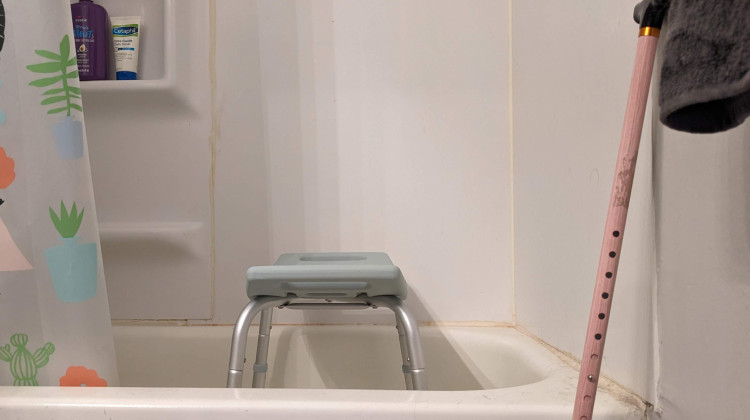
The Family and Social Services Administration plans to process about 900 members per month between two programs, meaning even if there is a slot available, it could take over a year for some members to be placed in the programs.
Lauren Chapman / IPB NewsSome Hoosiers are still unsure of where their access to home- and community-based services through Medicaid stands as Indiana starts working through its waitlist.
Some families say that the lack of communication from the Family and Social Services Administration is making it difficult to navigate decisions around care.
Thousands of new slots for the Health and Wellness Waiver and the Pathways waivers opened on July 1. However, FSSA plans to process about 900 members per month between the two programs. And thousands of members are currently waiting to be placed in the two programs – if there is even a spot available.
Colleen Jacobson and Katie Herendeen’s mother has been in assisted living for about four years, and qualified for the Pathways waiver in April. This was around the same time FSSA implemented the waitlist in response to last year’s $1 billion Medicaid forecasting error.
If their mother isn’t moved onto the waiver, Herendeen said their family will have to start the process to place her in a nursing facility. She would likely qualify for the traditional Medicaid program based on her medical need — but moving her to a nursing facility could negatively affect her health.
“We moved her from one room to another, and we really saw a big decline in her thinking and her ability to do day-to-day things that she normally did,” Herendeen said. “If we have to move [her] again, I'm sure that we'll see that again.”
Their mother has been in the same assisted living facility for the past four years. As someone with memory care needs, even a small transition can lead to issues with her care.
They had expected a seamless move into waiver services, since their mother’s assets had been spent down over the years, but Jacobson said everyone was surprised when the state introduced the waitlist as they were going through the process.
“We anticipated this is a good thing,” Jacobson said. “And then all of a sudden is like having the rug pulled out from under you.”
From what they had heard, even care facilities were unaware that the waitlist was being implemented until FSSA made the announcement. They were under the impression that if they had a slot they would hear about it in July.
They were surprised to learn that FSSA would be placing people into slots in smaller batches over the course of months or even years.
It will take the agency nearly a year to process the people currently on the waitlist for Pathways – like Herendeen and Jacobson's mother.
“That's quite a bit of a difference,” Jacobson said. “And what's the odds? So you you surround and pray for your mom to get on that list or you start to take action.”
Join the conversation and sign up for the Indiana Two-Way. Text "Indiana" to 765-275-1120. Your comments and questions in response to our weekly text help us find the answers you need on Medicaid and other statewide issues.
Herendeen and Jacobson share the responsibility with their other siblings, but they aren’t sure how long they will be able to sustain her care without the support of the Pathways waiver. Jacobson said she and her siblings all feel the need to find ways to support their mother even if it leads to financial hardship for themselves.
“That's a very difficult ask for more than half of us to come up with that additional monthly money at hand,” Jacobson said. “They're scraping and they're doing things — some of us are retired trying to figure out how to keep this.”
Jacobson said her family is having to make difficult decisions about care without much information on how FSSA is working through the waitlist.
“You're dealing with some very vulnerable people right here,” Jacobson said. “And my mom's lucky she's got family to try to supplement. Some of these patients have nobody to advocate for them.”
Jacobson said her family hasn’t heard anything from FSSA yet on where they are on the list. But if her family doesn’t hear anything soon, they might have to take the risk of moving their mother to a nursing care facility because of the financial stress that comes from that care month-to-month while they wait.
FSSA said it will continue to provide regular updates on the waitlist as it processes members.
Abigail is our health reporter. Contact them at aruhman@wboi.org.
 DONATE
DONATE






 Support WFYI. We can't do it without you.
Support WFYI. We can't do it without you.